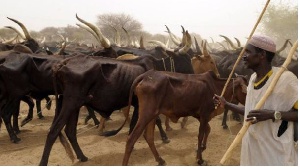The way we have gone about solving the perennial issue of cattle herders and farmland destruction is emblematic of our approach to solving many issues: merely reacting when there is a crisis and going back to our regular lives if that period of crisis passes. Think of flooding, the gas explosions, and the list goes on.
The so-called Fulani-herdsmen problem is now a recurring, predictable thing: at some point in every year, some community and cattle herders, mainly Fulani, will get into a confrontation. Property is damaged, and in some unfortunate cases, lives are lost. The government and citizens complain, get angry, adopt some lame, palliative solutions and as usual, we do nothing fundamental to really tackle the problem. The ongoing tit-for-tat hostilities in the Agogo area must break our hearts. We can and should do better as a nation. The sad part is that we know the herdsmen are not the ones who own the cattle. They merely work for a pittance. Yet, they endure most of the rage that we direct at this issue. I do not mean to imply that the herdsmen are blameless. They assume some responsibility. No one wants his or her crops or valuable farms destroyed.
So far, the only solution I have heard of is what some call fodder banks. These fodder banks are nothing more than land set aside for grazing. Such an approach will not work in the long term because it will give rise to what we call the “tragedy of the commons.” Think about it this way: land set aside is the “commons.” If we say everyone can bring only 100 cattle to feed on it for 3 hours each day, you know soon some people will leave their cattle there for 6 hours, bring 150, not 100 cattle. Pressure will build on the land as others start realizing some are cheating. Soon, there will be no grass left for anyone. I think more feasible solutions should be based on an economical and business approach. Some suggestions:
A long-term solution is to pass a law on compulsory ranching. By ranching, I mean the cattle have to be “housed” and fed on premises, say on the farms. This means cattle will not be allowed to move around unless on private lands of the owners. The idea of a ranching law has been raised in some quarters in the past. However, forcing cattle owners to move their livestock to ranches without proper planning will do more harm than good. A ranching law cannot and should not be passed in isolation. Ranching legislation should not be passed until critical feeding issues are addressed in a comprehensive manner. We need to think in terms of systems and consider unintended consequences before we legislate that cattle be ranched, otherwise it simply will not work and we would have substituted one set of problems for an even worse basket of headaches. The fact is the cattle need to be fed and livestock must feed around the clock.
The most feasible, and immediate solution to this, is to import fodder from abroad. The government or private businesses can import feed (alfalfa hay) from abroad for sale to ranchers. Alfalfa hay is nutritious, and can sustain the cattle better than the browsing that they do now. The average price of a ton of alfalfa hay in bales is about $210 /ton, CIF TEMA from Europe (GC900 approximately). The Ministry of Agriculture can temporarily import this hay and sell it to the ranches, then encourage some private businesses who presently import poultry feed to broaden their market to include hay. The fact is we all know that the Fulani do not own the cattle.
They are merely working for all the so-called big men-politicians, businesspersons etc. The owners are those going to pay for the fodder. It will make great economic sense for them. They simply may not realize that now, but some education is all they need to see the benefits for their bottom line. The average cow in Ghana looks chronically malnourished. That should tell us that browsing alone is not good enough, or adequate for their livestock. Not when the herdsmen must constantly be restraining the cattle from destroying valuable farmlands and crops. Proper feeding will make the cattle grow quicker, healthier, fatter, and their prices will be higher. It will therefore make economic sense to buy the imported alfalfa hay.
A second solution is to encourage silage production. Silage is hay and crops that are produced, and stored under controlled conditions and fed to animals when needed. There are folks at the Ministry of Agriculture who know about silage. However, I am yet to see a single commercial silage operation in the country. To produce commercial silage requires some technical knowhow. In Ghana, we can use maize and Sudan grass for silage.
The corn is harvested with the stock and leaves, everything, cut at the appropriate time, preserved by either burying or storing in the right bags for subsequent feeding. In Kenya for example, there are commercial silage operations that distribute silage to cattle farmers on a daily basis. By the way, this is a great business opportunity for folks who may be interested. The Fulani herdsmen themselves can be trained in silage making. A series of commercial silage operations in areas with cattle concentrations would be best.
Another solution, a more long-term one, is the commercial cultivation of alfalfa. Alfalfa is known as the “king of crops” when it comes to livestock feeding. The good news is that there are now varieties of alfalfa developed that are suitable for the tropics. I am aware of some limited experimentation in growing alfalfa in Northern Ghana. What is required is government support for proper feasibility studies for those ongoing efforts.
Sudan now grows alfalfa in commercial quantities for export to other parts of the Middle East. This is a long term, but feasible solution. Again, this is a great business opportunity for those interested. Both commercial silage and alfalfa growing will fit nicely into the current focus on agriculture. Other livestock, besides cattle, will also benefit from the availability of feed.
Feed mills are another, albeit more expensive, option. A viable commercial feed mill will probably run in the region of $400,000 all the way to $2 million. Again, this is a business opportunity for those who can afford it. I end this short piece with coming back to the need for a ranching law.
The government should not pass such a law, unless it has made adequate provisions for fodder. The options discussed above should be seriously considered. Commercial silage operations look like the most feasible because they do not involve any foreign exchange expenditure. However, the government needs to provide leadership on this issue and the Ministry of Agriculture should take the lead on it. Again, these are all great opportunities for our young entrepreneurs and building an ecosystem of support-training, education, financial assistance and marketing are important if this approach is to work.
Once the groundwork is laid, Parliament must move to pass a law on commercial ranching. Extensive consultation with all stakeholders must take place before any legislation. The idea is not to punish anyone. Rather, it is to promote peace, economic development and ultimately food security.
Insanity, they say, is doing the same thing over and getting the same results each time. It is about time we solve this problem finally. I am convinced that an economic and business approach presents the best option.
Opinions of Wednesday, 10 January 2018
Columnist: Dr. Henry Adobor



















